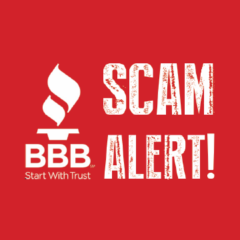
By Abigail Garvin, Director of Marketing & PR at BBB of the Upstate
Like many of us, Rebecca Chamblee uses her computer to connect with family and friends, share photographs, and research a recipe or two.
One morning, Mrs. Chamblee received a phone call from someone claiming to be the Microsoft Corporation. The caller seemed very knowledgeable and said her computer was infected with a virus and was susceptible to crashing. Fearing she could lose her personal information like her photos, Mrs. Chamblee provided her password, giving the fake representative remote access to her computer. The caller utilized scare tactics to assure her they could easily “eliminate” the virus if she purchased a service contract for $190.
However, when the contract arrived, Mrs. Chamblee knew something wasn’t quite right. She noticed three or more obvious typos – very unlike a company with the caliber of Microsoft.
Mrs. Chamblee decided to call Microsoft’s corporate office with the contact information provided on BBB.org. The officials at Microsoft informed her that they do not communicate by phone and that she had been scammed.
After reporting the scam to the Better Business Bureau and informing her credit card company, Mrs. Chamblee received another call from the scammer. They agreed to return her money if she provided her banking information so it could be deposited directly. When she refused, the scam artist, who already had access to her password information, crashed her computer system right before her eyes. Her files, photos, and computer icons – gone.
Mrs. Chamblee is not alone in her experience. The Internet is a land of opportunity for scammers.
In Mrs. Chamblee’s situation, the scam artist used a powerful weapon to win her over – her trust. They established a connection so she wouldn’t give a second thought to the caller’s true motivation.
It can be difficult to distinguish between a scam and a sales pitch. In some cases, callers are pushy but legitimate. In others, the calls are phishing scams that impersonate real businesses seeking personal information and credit card numbers. A salesperson will focus on the product or service they are trying to provide you, whereas, a scammer will focus on getting to your personal information as quickly as possible.
Fortunately, Mrs. Chamblee’s story has a happy ending. With the BBB’s guidance, she was able to recover all of her files and the credit card company refunded her money.
Knowledge & skepticism are powerful tools against scam artists. Here are a few important ways you can safeguard yourself:
- Never give out personal information like your credit card or bank account numbers, date of birth, Social Security or Medicare numbers over the phone, especially if it’s an unsolicited caller.
- Add your phone number to the Do Not Call Registry by visiting www.donotcall.gov. Law-abiding telemarketers who continue to call you after you register are subject to penalties.
- Report suspicious callers to family members, assisted living facility managers, neighbors, and friends.
- Don’t yield to high-pressure or emotional sales tactics. Remember, you can simply hang up the phone.
- Always contact your local BBB before dealing with a company or charity you are not familiar with.
BBB sees one of our most significant values in delivering consumers trustworthy businesses and charities. You can always check out a business online at bbb.org or call our office at 864-242-5052.



